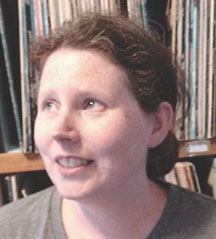
Mary Alexandra Agner met me at my usual corner at the Bloc 11 Café in Union Square to discuss her career in science, writing and poetry. Agner moved to Somerville in 1997, and told me that her first poetry publication was in Somerville’s Ibbetson Street magazine. Agner earned a degree from MIT and an MFA at Emerson College in Boston. At Emerson she studied with the late, great, and very eccentric poet Bill Knott. Agner said of Knott: “He was very influential and was very willing to work with me and other students. In fact Knott blurbed her first collection of poetry: “Doors of the Body.”

Mary Alexandra Agner
Agner’s latest venture is “Science News in Verse’ This project is hosted by PATREON, a crowd funding Internet site. People donate money on a monthly basis, and in return Agner writes verse concerning the latest science news. For instance, a recent poem that she composed was based on some fossils at a Yale University museum that were mislabeled as birds. Later they were found out to be dinosaurs. From this tidbit Agner was able to mine a poem about dinosaurs at sea. In the era of the dinosaur, the area we now call Kansas was largely a body of water, thus the dinosaurs at sea theme. Agner reflected: “It is a joy to put science to verse. Through this genre, it helps people become interested in science.”
Agner also has a column titled “Failing the Finkbeiner” ( based on the Finkbeiner test as defined here http://www.doublexscience.org/the-finkbeiner-test/) that champions the recent accomplishments of woman scientists. Agner told me” Although women have made strides in the past decades, there is still much discrimination, and much work to be done. My friends and I all have experienced discrimination in one form or the other.” The idea for “Freeing….” started with an obituary in the New York Times of a prominent rocket scientist, Yvonne Brill. The obit started out (according to Agner), with a lead sentence that referred how this top shelf scientist made great lasagna. Understandably, a lot of women scientists and women in general, were upset with this. Agner said, “This gave me the idea of how we can write about a female scientist without mentioning her cooking or kids. I decided to write reports on women scientists that didn’t focus on the fact that they are women, but that they are scientists with important work and accomplishments.
Agner told me she left the software industry to freelance as a writer. “It is a tough way to make a living, but I am making my way.’ But like any start-up, it takes time to take root and grow. In the meantime this industrious Somervillian will turn out poems and articles on a consistent basis. Agner finished her java, and left my nook, undoubtedly swept up by the street of the—Paris of New England.












Reader Comments